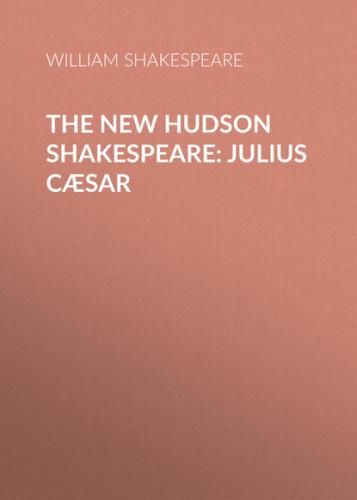William Shakespeare
The New Hudson Shakespeare: Julius Cæsar
Published by Good Press, 2019
EAN 4064066239442
Table of Contents
HENRY NORMAN HUDSON, LL.D.
PREFACE
ACT I.
INTRODUCTION AND NOTES BY
HENRY NORMAN HUDSON, LL.D.
EDITED AND REVISED BY
EBENEZER CHARLTON BLACK LL.D. (GLASGOW)
WITH THE COÖPERATION OF
ANDREW JACKSON GEORGE LITT.D. (AMHERST)
GINN AND COMPANY
BOSTON NEW YORK CHICAGO LONDON
ATLANTA DALLAS COLUMBUS SAN FRANCISCO
Entered at Stationers' Hall
Copyright, 1908
By GINN AND COMPANY
ALL RIGHTS RESERVED
424.12
The Athenæum Press
GINN AND COMPANY PROPRIETORS BOSTON U.S.A.
PREFACE
The text of this edition of Julius Cæsar is based upon a collation of the seventeenth century Folios, the Globe edition, and that of Delius. As compared with the text of the earlier editions of Hudson's Shakespeare, it is conservative. Exclusive of changes in spelling, punctuation, and stage directions, very few emendations by eighteenth century and nineteenth century editors have been adopted; and these, with every variation from the First Folio, are indicated in the textual notes. These notes are printed immediately below the text so that a reader or student may see at a glance the evidence in the case of a disputed reading and have some definite understanding of the reasons for those differences in the text of Shakespeare which frequently surprise and very often annoy. A consideration of the more poetical, or the more dramatically effective, of two variant readings will often lead to rich results in awakening a spirit of discriminating interpretation and in developing true creative criticism. In no sense is this a textual variorum edition. The variants given are only those of importance and high authority.
The spelling and the punctuation of the text are modern, except in the case of verb terminations in -ed, which, when the e is silent, are printed with the apostrophe in its place. This is the general usage in the First Folio. Modern spelling has to a certain extent been followed in the text variants; but the original spelling has been retained wherever its peculiarities have been the basis for important textual criticism and emendation.
With the exception of the position of the textual variants, the plan of this edition is similar to that of the old Hudson Shakespeare. It is impossible to specify the various instances of revision and rearrangement in the matter of the Introduction and the interpretative notes, but the endeavor has been to retain all that gave the old edition its unique place and to add the results of what seems vital and permanent in later inquiry and research.
While it is important that the principle of suum cuique be attended to so far as is possible in matters of research and scholarship, it is becoming more and more difficult to give every man his own in Shakespearian annotation. The amount of material accumulated is so great that the identity-origin of much important comment and suggestion is either wholly lost or so crushed out of shape as to be beyond recognition. Instructive significance perhaps attaches to this in editing the works of one who quietly made so much of materials gathered by others. But the list of authorities given on page li will indicate the chief source of much that has gone to enrich the value of this edition. Professor W.P. Trent, of Columbia University, has offered valuable suggestions and given important advice; and to Mr. M. Grant Daniell's patience, accuracy, and judgment this volume owes both its freedom from many a blunder and its possession of a carefully arranged index.
INTRODUCTION
Note. In citations from Shakespeare's plays and nondramatic poems the numbering has reference to the Globe edition, except in the case of this play, where the reference is to this edition.
I. SOURCES
No event in the history of the world has made a more profound impression upon the popular imagination than the assassination of Julius Cæsar. Apart from its overwhelming interest as a personal catastrophe, it was regarded in the sixteenth century as a happening of the greatest historical moment, fraught with significant public lessons for all time. There is ample evidence that in England from the beginning of Elizabeth's reign it was the subject of much literary and dramatic treatment, and in making the murder of "the mightiest Julius" the climax of a play, Shakespeare was true to that instinct which drew him for material to themes of universal and eternal interest.
The Main Story
I. North's Plutarch. There is no possible doubt that in Julius Cæsar Shakespeare derived the great body of his historical material from The Life of Julius Cæsar, The Life of Marcus Brutus, and The Life of Marcus Antonius in Sir Thomas North's translation of Plutarch.[1] This work was first printed in 1579 in a massive folio dedicated to Queen Elizabeth. A second edition appeared in 1595, and in all probability this was the edition read by Shakespeare. The title-page is reproduced in facsimile on page ix.
This interesting title-page gives in brief the literary history of North's translation, which was made not directly from the original Greek of Plutarch, but from a French version by Jacques Amyot, bishop of Auxerre.[2] In 1603 appeared a third edition with additional Lives and new matter on the title-page.[3] There were subsequent editions in 1612,[4] 1631, 1656, and 1676. The popularity of this work attested by these reprintings was thoroughly deserved, for North's Plutarch is among the richest and freshest monuments of Elizabethan prose literature, and, apart altogether from the use made of it by Shakespeare, is in itself an invaluable repertory of honest, manly, idiomatic English. No abstract of the
